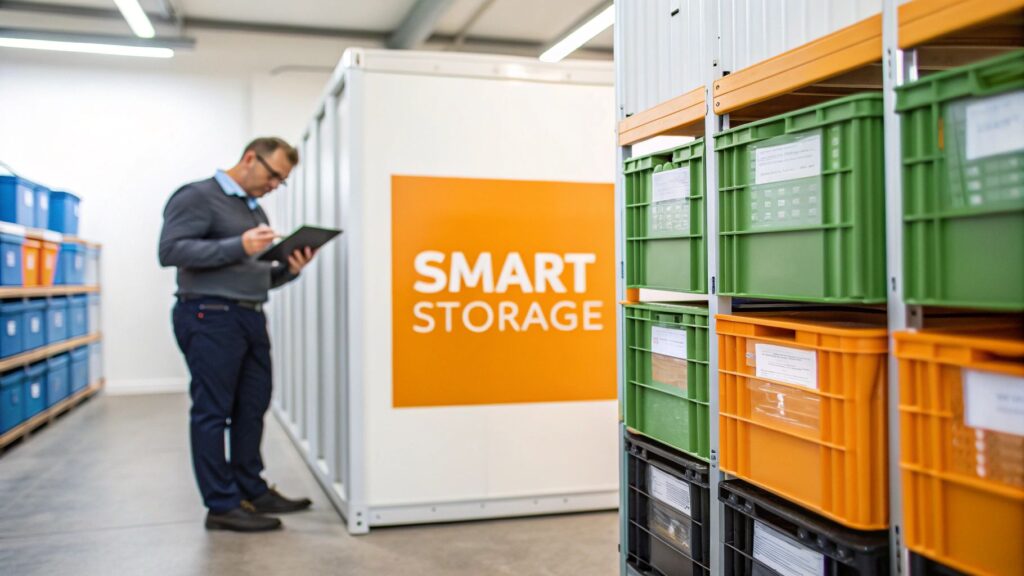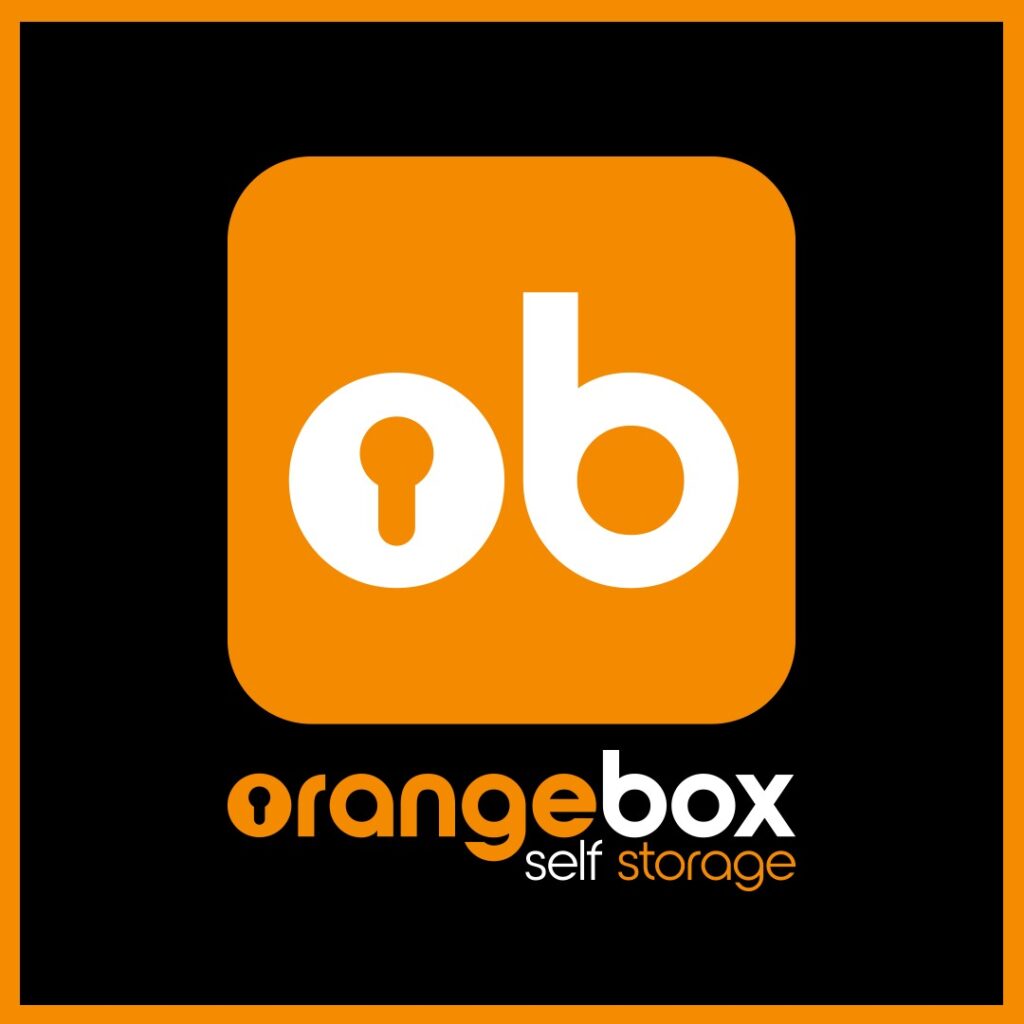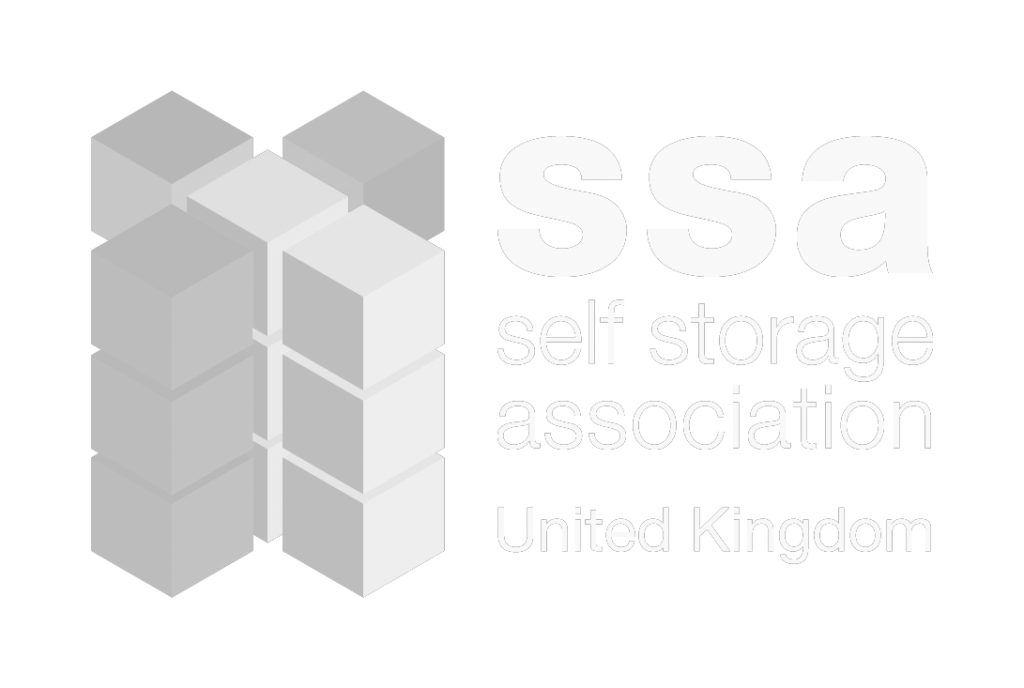Self-storage isn't just for moving house anymore. For a growing number of businesses, it's a savvy strategy for staying agile and keeping costs down. It offers a flexible, scalable space to manage everything from inventory and archived documents to tools and equipment, all without the anchor of a long-term commercial lease.
Why Smart Businesses Use Self Storage
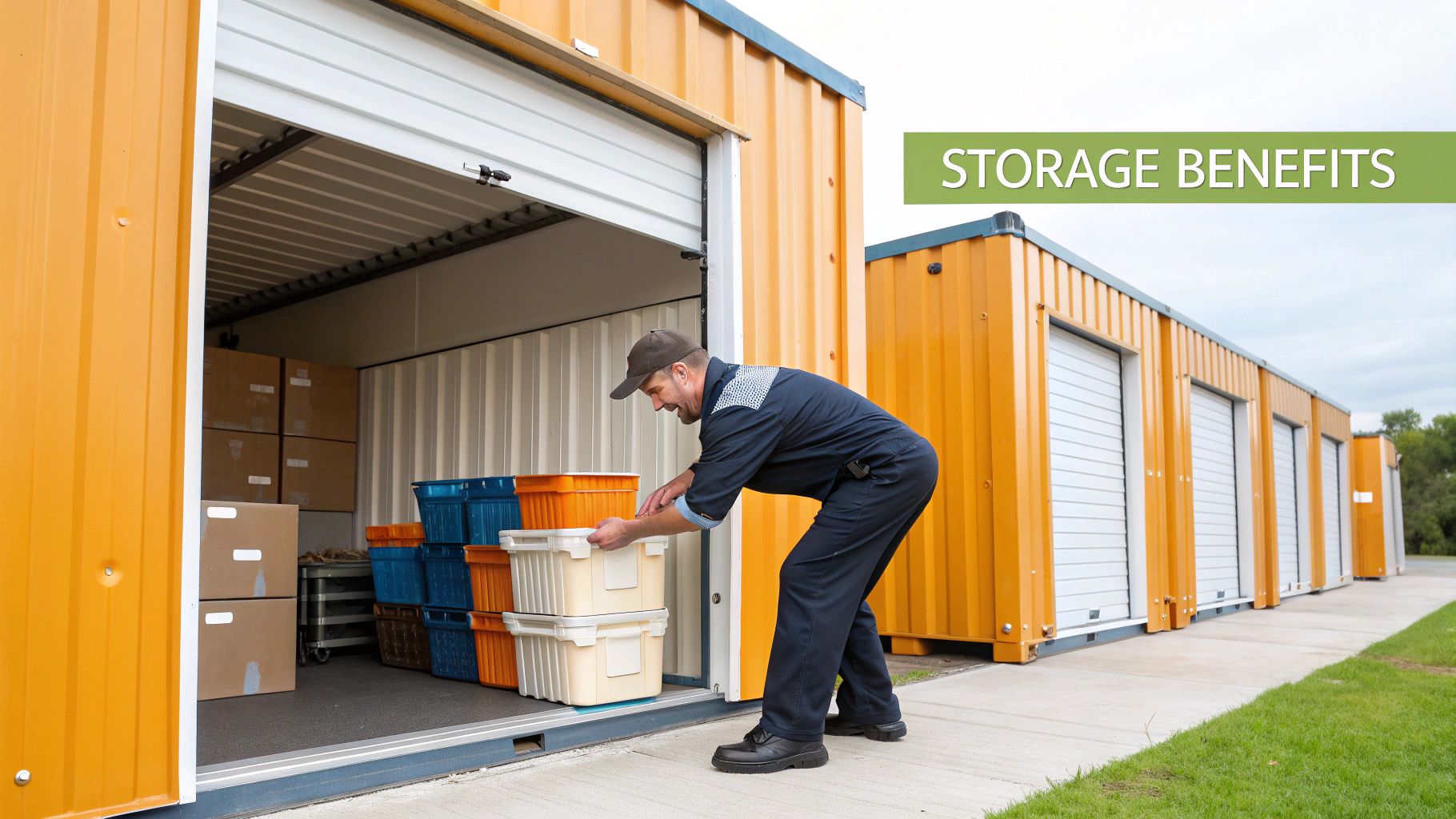
Think of a traditional commercial property lease as an expensive, restrictive annual contract. It often leaves you paying for more space than you actually need, tying up precious capital in bricks and mortar that could be used for growth. It’s a model that can seriously drain cash flow.
Self-storage flips that idea on its head. It’s much more like a pay-as-you-go service.
This on-demand approach adapts to the natural rhythm of your business. For an e-commerce startup, that might mean scaling up stock for the Christmas rush and then easily downsizing in January without facing any penalties. For a local tradesperson, it’s a secure hub for tools and materials, far more convenient than a distant, oversized warehouse.
A Modern Tool for Business Agility
Using self-storage is no longer a niche workaround; it’s a mainstream business strategy. In fact, business users now make up about 25% of all self-storage customers in the UK, a figure driven by the rise of remote working and the e-commerce boom. A huge 33% of this demand comes from simple space constraints, while another 17% is directly linked to commercial activities.
This really highlights a fundamental shift in how modern companies operate. They’re moving away from fixed overheads and embracing more variable, cost-effective models. Self-storage directly solves some of the most common business headaches:
- High Overheads: You can sidestep costly commercial leases, business rates, and utility bills.
- Inefficient Inventory Management: It gives you a centralised, organised space for all your stock.
- Lack of Scalability: You can increase or decrease your space month-to-month as your needs change.
By converting fixed property costs into a flexible operational expense, businesses can reinvest capital into growth, marketing, and product development—the activities that truly drive success.
Essentially, self-storage for businesses acts as a strategic buffer. It gives you the physical room to expand, pivot, or downsize without getting locked into financially draining commitments. You can explore our dedicated business storage solutions to see just how this flexible approach could benefit your operations.
How to Choose the Right Storage Unit
Picking the right storage unit is one of the biggest calls you’ll make. Get it wrong, and you’re either stuck with a chaotic, unusable space or you’re literally paying for empty air. The goal is to hit that sweet spot perfectly tailored to your business.
Don’t just get hung up on square footage. The first real step is to figure out the actual, usable space your business needs. You have to think about your current inventory, sure, but also leave room for growth, aisles to actually get to your stuff, and maybe even some shelving to make the most of the vertical space.
An e-commerce business with 1,000 boxed products has completely different requirements than a contractor who needs to lock up bulky tools and equipment. Try to picture how you'll use the unit day in and day out—it’ll save you a lot of headaches down the road.
Matching the Unit Type to Your Inventory
Once you’ve got a rough size in mind, the next job is to pick the right kind of unit. This choice has a direct impact on the safety and lifespan of your stock, making it a crucial decision for any business using self storage for businesses.
There are three main types to get your head around, and each one serves a different purpose.
- Standard Indoor Units: These are spot-on for storing items that aren’t fussy about temperature or humidity. Think office furniture, archived files, or durable retail stock.
- Outdoor Drive-Up Units: For pure convenience, you can’t beat these. They’re brilliant for businesses that need to load and unload heavy or bulky gear frequently. Contractors and tradespeople love them for tools and building materials.
- Climate-Controlled Units: This is non-negotiable if your items are sensitive. If you’re storing electronics, pharmaceuticals, vital paper records, or delicate textiles, a climate-controlled unit is your only real option to protect them from damage caused by extreme temperatures and humidity.
The image below gives you a clear picture of how businesses tend to choose between these options.
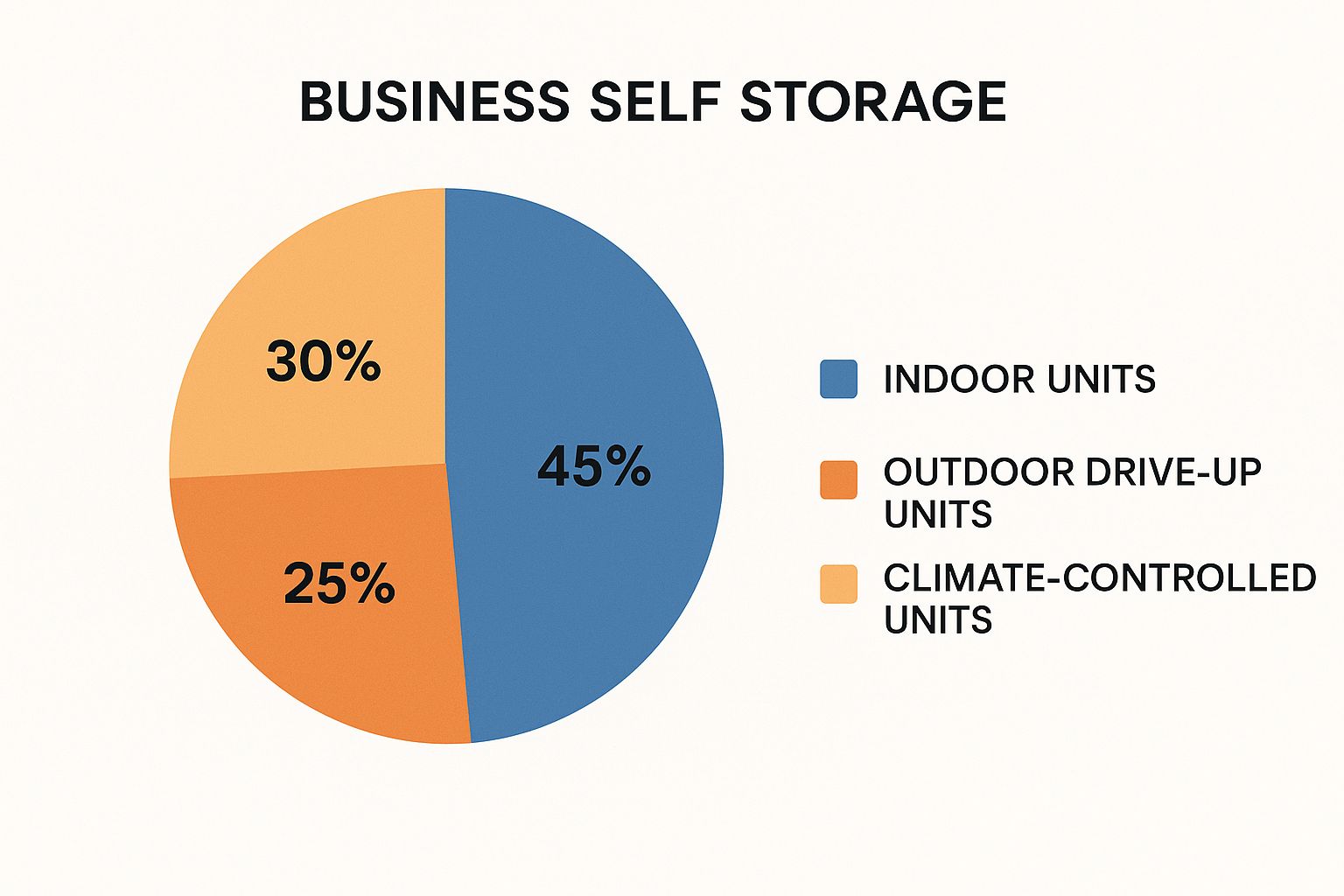
As you can see, nearly half of businesses (45%) go for standard indoor units, striking a good balance between security and cost. Meanwhile, specialised climate control is essential for a significant 25% of business users.
To help you visualise what you might need, here’s a quick guide to common unit sizes in a business context.
Business Storage Unit Size Guide
| Unit Size (sq ft) | Equivalent To | Ideal For Storing |
|---|---|---|
| 50 sq ft | Large walk-in wardrobe | 50-75 archive boxes, small office furniture, excess stock |
| 75 sq ft | Small single garage | Pallet of stock, multiple desks and chairs, larger equipment |
| 100 sq ft | Standard single garage | E-commerce inventory, trade tools, multiple pallets |
| 150 sq ft | Large single garage | Contents of a small office, significant retail inventory |
| 200+ sq ft | Double garage | Bulk stock, machinery, entire office relocation contents |
This table should give you a better feel for how much space you'll actually get and what you can realistically fit inside.
Considering Location and Accessibility
The final piece of the puzzle is logistics. The most amazing unit in the world is useless if it’s a pain to get to or locked up when you need access. Look for a facility that’s strategically placed to cut down travel time between your office, suppliers, and customers.
A well-located storage unit isn't just a holding space; it's an operational hub that can streamline your entire workflow, from stock management to order fulfilment.
Beyond location, you need to check the facility’s access hours. Proper 24/7 access can be a complete game-changer for businesses that don’t stick to a typical 9-to-5 schedule. It’s also worth asking about delivery acceptance services. Letting the facility staff sign for your parcels can save you countless hours and make sure you never miss an important shipment. Getting the unit type right is essential, and you can learn more about indoor vs container storage in our detailed guide.
Key Facility Features Your Business Needs
When you're looking for self storage for businesses, you quickly realise not just any old space will do. You're not just storing stuff; you're safeguarding company assets, your inventory, your livelihood. The right features can turn a storage unit into a genuine operational advantage, while the wrong ones just create headaches.
Your first port of call should always be security. Look beyond a simple padlock on the door and really dig into the facility's entire security setup. You need to see comprehensive measures working together to protect your gear around the clock.
Proper security is a layered system. It starts with a strong perimeter—think high fencing and controlled gate access—and goes all the way down to individual unit alarms and sharp, high-definition CCTV cameras watching over key areas 24/7. These are the things that let you sleep at night, knowing your goods are protected.
Seamless Accessibility and Logistics
Security is paramount, but so is practical, day-to-day access. A business unit has to be easy to get to, especially if you’re constantly shifting stock or equipment. Can you imagine trying to reverse a commercial van down a poky lane or lugging heavy boxes up three flights of stairs? It’s an operational nightmare waiting to happen.
Make sure to prioritise facilities that were clearly designed with business users in mind. This means looking for:
- Wide Driveways: Absolutely essential for getting larger commercial vehicles in and out without a fuss.
- Loading Bays: A dedicated spot for loading and unloading can seriously speed up your workflow and save your back.
- True 24-Hour Access: Your business doesn't stick to a 9-to-5 schedule, so why should your storage? Round-the-clock access gives you the ultimate flexibility to run things on your own time.
For businesses that need to get in and out quickly with a vehicle, it’s well worth exploring the benefits of dedicated drive-up storage units. These are a game-changer, letting you park right at your unit’s door to make loading and unloading a breeze.
Crucial Operational Support
Finally, zoom in on the features that directly support your daily business functions. These are the little details that separate a basic storage provider from a real business partner. Flexible month-to-month contracts are fairly standard, but they're vital for managing fluctuating inventory and seasonal demands without getting locked into long-term financial commitments.
A key feature, and one that’s often overlooked, is delivery acceptance. A facility that can securely take in shipments for you is a massive help. It saves you from having to be on-site for every single delivery, freeing up your time for more important things.
The industry is also getting smarter with technology. In fact, 68% of UK self storage businesses now use artificial intelligence to improve their services, all while running incredibly lean operations with an average of just 2.6 staff members per site. You can learn more about how technology is shaping the storage sector on cushmanwakefield.com. For you, this tech adoption means better security, smoother admin, and a more dependable experience for your business.
Organising Your Unit for Peak Efficiency

A disorganised storage unit is more than just an eyesore; it's a hidden cost that slowly eats away at your time and money. To get the most out of your space, you need to stop thinking of it as a cupboard and start treating it like a high-efficiency mini-warehouse from day one. This isn't about just stacking boxes—it's about a structured approach to inventory management.
The first step, before a single item goes inside, is to map out a logical layout. You need to imagine your unit as a small storeroom. The easiest win is to leave a clear walkway down the centre, giving you access to items at the back without the headache of unloading everything. A little bit of planning here saves countless hours down the road.
Next, look up. Your floor space is limited, but the height of your unit is a massive, often-wasted asset. Investing in sturdy, free-standing industrial shelving is a game-changer for any business using self storage for businesses. It instantly multiplies your usable area and gets your stock off the floor, protecting it from any potential damage.
Creating a System That Works
With a solid layout and shelving in place, it’s time to build a system that anyone on your team can understand. A clear and consistent labelling method is your best friend here. Don't just scribble "Stock" on the side of a box; get specific.
- Detailed Descriptions: Label every box with the product name, SKU, and the exact quantity inside.
- Visible Placement: Make sure labels are always facing the central aisle so you can see what’s what at a glance.
- Colour Coding: Use different coloured labels or markers for different product categories. This makes visual searches much faster.
This level of detail turns a chaotic mountain of inventory into a searchable database. You'll know exactly what you have and where to find it in seconds, not hours.
A well-organised unit does more than save time—it prevents costly mistakes like stockouts or accidentally shipping expired products. It’s the backbone of efficient off-site inventory control.
If you’re dealing with perishable or date-sensitive goods, inventory principles are non-negotiable. The 'First-In, First-Out' (FIFO) method is essential for ensuring your oldest stock gets sold first, which is crucial for minimising waste. A food business, for example, could arrange its stock on the shelves with the newest items at the back and the oldest at the front, creating a natural FIFO flow.
Leveraging Simple Digital Tools
Your organisational efforts shouldn't just stop at the unit door. A real-time digital log of your inventory is just as important as the physical setup. The good news is this doesn't need to be complex or expensive; even simple tools can have a huge impact.
A shared spreadsheet that your whole team can access works as a basic but surprisingly effective inventory list. For something a bit more advanced, dedicated inventory management software can sync with your sales platform, giving you a live overview of stock levels.
When you combine this digital record with your physical organisation, you'll always have a precise handle on your assets. This proactive approach stops stockouts before they happen, makes order fulfilment a breeze, and turns self storage for businesses into a powerful strategic tool rather than just a place to keep things.
Navigating the UK Self Storage Market

To get the best value from self storage for businesses, it helps to get a feel for the bigger picture. The UK self storage industry is booming, but the growth isn't spread evenly across the country. Understanding these regional quirks in cost and availability can give your business a real strategic edge.
It really boils down to supply and demand. You’ll almost certainly pay a premium for a storage unit in a hotspot like the South East compared to the exact same space in the North West. That’s vital information for any company with a national presence or plans to branch out into new territories.
Making the right choice means zooming out and seeing the whole map. When you understand these market dynamics, you can budget more accurately and forecast future costs, making sure your storage solution stays affordable as your business grows.
Regional Growth and Business Demand
The number of businesses and people in an area creates huge differences in the storage market. It’s no surprise that places with thriving commercial hubs see higher demand for flexible space. This is directly reflected in the growth forecasts, with the South East expecting a 6.3% bump in storage space and the North West a 4.9% increase just to keep up.
But here’s an interesting twist: awareness of self storage as a business tool can be surprisingly low in less built-up areas. In some parts of the UK, as many as 37% of people haven't even heard of it. You can find more fascinating insights like this in these self storage trends on storeganise.com. For businesses operating outside the major cities, this is a golden opportunity to lock in great rates before everyone else catches on.
Choosing a location isn’t just about what’s convenient; it's a strategic financial move. By looking at regional supply, you can pinpoint facilities that offer better value and more options, which feeds directly into your bottom line.
Future-Proofing Your Storage Strategy
The world of work is changing, and the self storage industry is changing right along with it. The unstoppable rise of e-commerce and the shift to remote work are creating a long-term demand for flexible, decentralised storage that isn’t going away anytime soon.
What this means is that self storage is no longer just a temporary fix. It’s becoming a key part of the modern business playbook. It gives you the agility to handle fluctuating stock, stash equipment for your remote team, or archive documents without paying for expensive office space you don’t need. Seeing these trends helps you appreciate the lasting value a good storage unit can bring.
To get a better idea of what’s out there, you can explore our secure self storage options in Nottingham for home and business and see for yourself how the right facility can support your long-term goals.
Common Questions About Business Self Storage
Even after you’ve weighed the benefits, picked a unit, and planned your inventory, a few questions might still be nagging you. That’s completely normal. Using self storage is a strategic move for your business, and nailing the details is what makes it work.
To help you get over the final hurdle with confidence, we’ve put together the most common queries we hear from business owners just like you. Think of it as a final checklist before you dive in.
What Kind of Insurance Do I Need for My Business Goods?
This is one of the most practical—and important—questions to get answered. Almost every single storage facility will require you to have insurance for your stored goods. It’s a non-negotiable part of the rental agreement, there to protect both you and the facility.
Before you rush out and buy a new policy, your first stop should be your existing business insurance. Many commercial policies already include a clause for goods stored off-site, which might be all the cover you need. A quick phone call to your insurer is the best way to find out.
If your current policy doesn’t cut it, you'll need a dedicated self storage insurance plan. Most facilities offer their own policies right there at the desk, which is convenient, but you’re always free to shop around with third-party providers. The main thing is to make sure the coverage amount reflects the real value of your stock and equipment and protects you against relevant risks like theft or water damage.
Are There Items I Am Not Allowed to Store?
Yes, absolutely. For safety, legal, and insurance reasons that are taken very seriously, every self storage facility has a strict list of prohibited items. Storing anything on this list can lead to your contract being terminated immediately, and potentially legal trouble.
While the exact list can differ slightly from one provider to the next, it almost always includes:
- Hazardous or Flammable Materials: This is a big one. It covers anything that can catch fire, like fuel, paint, solvents, chemicals, and compressed gas canisters.
- Perishable Goods: Any food items that can spoil are a definite no-go. They attract pests, which can cause a huge amount of damage to other people's units, not just your own.
- Illegal or Stolen Goods: This should be obvious, but storing anything illegal is strictly forbidden.
- Living Things: Another straightforward one—no plants or animals allowed.
Before you sign any paperwork, always ask to see the facility's complete list of prohibited items. It’s a simple step that ensures your business inventory is fully compliant and saves you from any headaches down the line.
Can I Work from My Self Storage Unit?
This is a common source of confusion, but in nearly all cases, the answer is no. A standard self storage rental agreement is very clear: the unit is for storage only. That means you can’t set up a desk, meet clients, or run your day-to-day operations from inside the unit itself.
Your storage unit is designed to be a secure, passive space for your assets, not an active workspace. Using it as an office or workshop often violates the facility's insurance and local council regulations.
That said, the industry is catching on to what modern businesses need. A growing number of forward-thinking facilities now offer more than just storage lockers. You can find places with dedicated co-working spaces, small rentable offices, or even light industrial workshops right on site. If you need a combined solution for both storing and working, make a point of looking for facilities that advertise these multi-use business services.
How Flexible Are Business Storage Contracts?
Flexibility is one of the main reasons businesses turn to self storage instead of getting locked into traditional commercial leases. The industry standard is a month-to-month rental agreement, which gives you incredible agility for managing your stock and your cash flow.
This model is perfect for businesses with inventory that goes up and down. You can easily switch to a larger unit to handle a big shipment or downsize during a quiet spell without being penalised. There are no rigid, long-term commitments tying you down.
When you sign up, just be sure to ask about the notice period for making changes or ending your agreement. This is usually somewhere between 7 and 30 days, which is more than enough time to plan ahead. This nimble approach means your storage can grow and adapt right alongside your business.
Ready to find a flexible and secure storage solution that scales with your company? At Orange Box Self Storage, we provide a wide range of unit sizes and business-focused features to support your growth. Explore our business storage options today!

